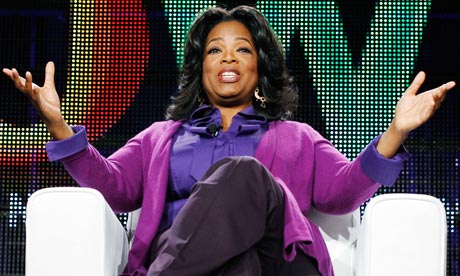'People will forgive you for being wrong, but they will never forgive you for being right - especially if events prove you right while proving them wrong.' Thomas Sowell
Search This Blog
Showing posts with label Matt Damon. Show all posts
Showing posts with label Matt Damon. Show all posts
Monday, 2 December 2013
Monday, 15 August 2011
Oprah and the philanthropy that chokes
Billionaire celebrities want to save the world Oprah Winfrey-style. But their giving has a price

Oprah Winfrey has given money to New Orleans, HIV/Aids prevention, abused women's shelters and private scholarships. Photograph: Mario Anzuoni/Reuters
Media empress Oprah Winfrey has been nominated for a special Oscar, the Jean Hersholt award, for those "whose humanitarian efforts have brought credit to the industry". This has created mild controversy in the US, with some charging that she is insufficiently Hollywood to merit an award held by the likes of Elizabeth Taylor and Paul Newman.
But Winfrey is as good a choice as any to confer an aura of piety on an industry better known for lavish lifestyles than saving the world. Her contributions to charitable causes have included reconstruction in New Orleans, HIV/Aids prevention, abused women's shelters, church charities and private school scholarships for disadvantaged children.
More interesting is why humanitarianism has assumed such importance as a must-be-seen-to-be-doing-it activity for the rich and the famous. From the obligatory royal photo-op with the homeless on LA's Skid Row to the ubiquitous images of white female celebrities cradling African babies, exhibitionist "caring" is as essential a marker of wealth and celebrity as signature scents and personal assistants.
It's too easy to argue this is about mitigating guilt and resentment. More significant is how billionaire benevolence is closely tied to the big neoliberal political manoeuvres of our time. This relationship can be scrutinised without necessarily questioning Winfrey's personal sincerity or denying that wealthy giving benefits a few.
Brand Oprah is a seamless and hugely influential melding of capitalism, self-help, humanitarian aspirations and spirituality. Endless consumption is encouraged by personal recommendations and lavish freebies from iPods to jewellery. At the same time, disciples can practise tasteful austerity with "debt diets" reminding us that "we are all responsible for everything that happens to us". The poor, too, are responsible both for their condition and for overcoming it. Buying things for the deserving poor – and Winfrey is clear that they are not all deserving – must be seen as "giving them bootstraps".
Pledging to "destroy the welfare mentality", Winfrey has often suggested that receiving state assistance is a choice, one she herself rejected. Her grand philanthropic acts, such as the failed experiment to move 100 Chicago families into private housing during Bill Clinton's "welfare reform" efforts, are accompanied by politically welcomed criticism of public assistance as dependence. Yet as psychologist Bruce Levine notes, it is precisely "fundamentalist consumerism" which destroys self-reliance. Winfrey has been justifiably accused by activists of "reinforcing the US war on the poor" by blaming victims.
In practising what should really be called "humanitarian privatisation", Winfrey and other philanthropists like Bill Gates have targeted public education with missionary zeal, speaking authoritatively on a subject they know little about. Having decided not to donate to inner-city public schools after criticising them and deeming their students unwilling to learn, Winfrey has publicly backed those advocating "charter schools", the US equivalent of free schools – including Gates and the makers of a controversial film, Waiting for "Superman", which attacks teachers and unions. In a parallel move, Rupert Murdoch is going ahead with plans to sponsor an academy in east London over the objections of the local council.
The billionaire "humanitarianism" of Winfrey, Gates and Murdoch is deeply compromised not only by its failure to acknowledge the causal relationship between extreme wealth and great poverty but by participating in an ideological assault on the welfare state. It posits itself as the only way to change the world – from above and with a wealthy few firmly in control.
A Hollywood celebrity more worthy of our respect is Matt Damon who, as American schoolteachers demonstrated this month in a Save Our Schools rally, confronted media suggestions that job security made teachers lazy. In a video clip that has gone viral, Damon lambasts "MBA-style thinking" as "the problem with [education] policy right now". This solidarity with the aspirations of the many and not the self-interested paternalism of the few is the humanitarianism that our times call for.
- © 2011 Guardian News and Media Limited or its affiliated companies. All rights reserved.
Subscribe to:
Comments (Atom)
